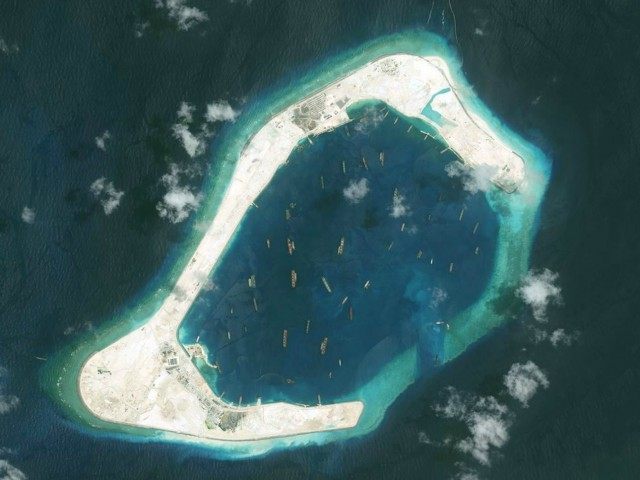The Malaysian government is seeking to expand cooperation with Australia to combat China’s expansive construction projects in the South China Sea, suggesting Beijing’s behavior in the region demands “pushback” from relevant parties.
“If the reports we’ve received from various sources regarding the buildup and placement of military assets in the Spratlys are true – this forces us in a pushback against China,” Defense Minister Hishammuddin Hussein said Tuesday, announcing a meeting with Australian Defense Minister Marise Payne to find joint ways to “hold China to their promise of not placing military assets in the area.”
Hishammuddin noted that he is also seeking to meet with leaders from other affected countries, including Vietnam and the Philippines. While China claims nearly the entire South China Sea as its exclusive sovereign territory, with officials repeatedly claiming the waters have been Chinese “since ancient times,” Malaysia, Brunei, Taiwan, the Philippines, and Vietnam all contest this claim. There is no precedent in international law that upholds China’s claims. Vietnam, the Philippines, and Malaysia specifically object to construction in the Spratly Island chain, where China has placed fighter jets and surface-to-air missiles on artificial islands it has constructed, while claiming not to be engaging in militarization.
“I will also consult other Asean leaders especially the immediate stakeholders in the issue namely those from Vietnam and the Philippines,” Hishammuddin announced Tuesday, noting that Malaysia will not seek to place military assets in the South China Sea and that it “cannot act alone in stopping the aggressive actions.”
In the past month, China has expanded propaganda efforts to assert that its constructions in the South China Sea will have civilian, not military, uses. Most recently, China announced that it would soon begin offering civilian flights to Woody Island, in the Paracel Island chain. Vietnam contests China’s claims in the Paracel Islands. Beijing has also announced the opening of a “tsunami alert center” in disputed South China Sea territory, allegedly intended for the use of all the nations in the region.
China has also announced the creation of an “international maritime judicial centre” to handle disputes in contested waters. “(We) must resolutely safeguard China’s national sovereignty, maritime rights and other core interests,” Chief Justice Zhou Qiang said in announcing the new tribunal. He did not provide details on when the center would open. The center can be expected to take cases regarding territorial sovereignty in lieu of international courts that China does not respect. China is currently embroiled in a case at the Permanent Court of Arbitration at The Hague, where the Philippines has requested a ruling outlining where China’s border lies. The verdict is expected very soon, and China has vowed to disregard it no matter the outcome.
China’s disregard for the Philippine case and its usurpations in Philippine waters have prompted significant backlash in that country. “Anti-China sentiments in the Philippines are at a historic high, and it is serving as a new glue for patriotic mobilisation,” Richard Javad Heydarian, a Manila-based academic, told The Sydney Morning Herald. The newspaper notes that, according to a Pew poll, 91 percent of Philippine citizens said they were either concerned or very concerned about China’s work in the South China Sea. The issue has also become a major topic of discussion in the ongoing presidential elections there.
Australia has so far taken a small role in opposing China’s expansion, though Malaysia is not the only country looking to see Canberra impose its military might. Australia has instead opted to aid the United States with missions in the region. “We’ve got a U.S. plane coming in pretty much every day,” Royal Australian Air Force Chief Leo Davies said Tuesday, noting that Australia does not intend to cease military exercises it has conducted for years in the South China Sea even if they occur in territories the Chinese government claims as its own.
He concluded:
This is about an international approach to international law and how that’s applied. … I will abide by the rules of the air, we will fly in the airspace we are entitled to, we will put our diplomatic clearances in for the places we need to cross into and we will operate as we have done for the past 30-plus years in the South China Sea.

COMMENTS
Please let us know if you're having issues with commenting.